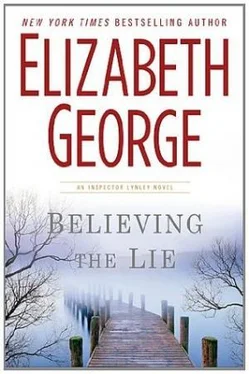“I’d like you to take this on,” Hillier told Lynley. “You’ll have to go up to the Lakes and all of it has to be done with complete discretion.”
A police investigation managed with complete discretion, Lynley thought. He wondered how he was meant to accomplish that.
Hillier elucidated. “No one will know you’ve gone there. And the local police won’t know you’re doing this. We don’t want to give the impression that the IPCC’s about to get involved. No feathers ruffled but no stone unturned. You know how to manage that.”
The fact was that he didn’t. And there was something else that made him uneasy. He said, “Superintendent Ardery is going to want to — ”
“I’ll handle Superintendent Ardery. I’ll handle everyone.”
“So I’m to work on this completely alone?”
“No one at the Yard can be involved,” Hillier said.
This seemed to be code for the fact that Lynley was meant to do nothing at all if Nicholas Fairclough turned out to be a killer. He was to leave him to the hands of his father, to the hands of God, or to the hands of the Furies. All of this amounted to an investigation Lynley wanted no part of. But he knew he wasn’t being requested to make a trip up to Cumbria. He was being told to do so.
FLEET STREET
THE CITY OF LONDON
Rodney Aronson had clawed his way to his present position as editor of The Source through means both fair and foul, and one of those means was the cultivation of an impressive collection of snouts. He was where he wanted to be in his life, which was sitting in an impressive if somewhat chaotic office where he could wield absolute power, but this did not prevent him from feeling grievances. He hated arrogance. He hated hypocrisy. He hated stupidity. But most of all, he hated incompetence.
Following a story was not rocket science. Neither was chivvying it along. Following merely required three things: research, shoe leather, and doggedness. Chivvying required a willingness to see one’s fellow humans squirm and, if necessary, be squashed. If this latter requirement itself required a bit of slithering on the part of the reporter, what of it? The end product was the story and if the story was big enough with an appropriate amount of sensation attached to it, big sales were the result. Big sales translated into increased advertising, which translated into increased revenue, which translated into orgasmic delight from The Source ’s chairman, the cadaverous Peter Ogilvie. At all costs, Ogilvie needed to be kept well oiled with good news in the form of profits. As to whose head or reputation rolled in pursuit of these, it mattered not.
Granted, the story of Nicholas Fairclough’s putative redemption from the clutches of drugs had been a snore of monumental proportions. They could have used it in operating theatres in place of anaesthetic, such a soporific had it been. Now, however, things were looking up. Now, it seemed, Rodney might not have to defend the expenditure of Zed Benjamin’s initial trip to Cumbria to develop the story, no matter the incredible cost the reporter had incurred.
But that thought brought forward the whole issue of journalistic stupidity. Rodney could not see how idiot Benjamin could have failed yet a second time to nose his way into a story when the damn smell of it was right in front of him. Another five days tramping round Cumbria had resulted in nothing but an extension of the tedious panegyric he’d already created about Nicholas Fairclough, his doped-up past, his reformed present, and his doubtless sanctified future. Other than that, there was nada to interest the typical Source reader. There was zero, nought, and double nought with nuts.
Receiving the news from a head-hanging Benjamin that there was nothing more he could possibly add to what he’d written, Rodney knew he should kick the bloke out on his ear. He couldn’t explain to himself why he hadn’t done so, and he thought at first he might be getting soft. But then one of his snouts phoned in, passed along a delectable tip, and Rodney reckoned he might not have to sack Benjamin after all.
What the snout had to say constituted an instructive moment, and since Rodney Aronson loved instructive moments nearly as much as he loved anything containing cacao, he sent for the red-haired giant and enjoyed a Kit Kat that he washed down with an espresso from his personal machine, this latter a gift from Butterball Betsy, a wife who knew many ways to please. That most of them were gustatory didn’t bother him.
Rodney had finished the Kit Kat and was making himself a second espresso when Zed Benjamin lumbered into the room. Damn if he still wasn’t wearing the beanie, Rodney thought with a sigh. He had little doubt that the dumbo had yarmulked his way round Cumbria a second time, successfully putting everyone off yet again. Rodney shook his head in resignation. The folly he had to endure as editor of The Source sometimes truly offset its delights. He decided not to mention the headgear again. He’d done so once, and if Benjamin wouldn’t take his advice, there was nothing for it but to let him sink under the weight of his own nonsensical inclinations. He’d learn or he wouldn’t, and Rodney knew which alternative was more likely. End of story.
“Shut the door,” he said to the reporter. “Take a seat. Give me a second here.” He admired the creamy nature of his concoction and turned off the machine. He carried his drink to the desk and sat. “Death is sex,” he said. “I reckoned you’d work that out for yourself, but it seems you can’t. Got to tell you, Zedekiah, this line of work might not be for you.”
Zed looked at him. He looked at the wall. He looked at the floor. He finally said, “Death is sex,” so slowly that Rodney wondered if the man’s brains had gone the way of his footwear because for some reason he was wearing not respectable shoes but instead very odd-looking sandals with tire treads for soles, along with striped socks that appeared to be handmade from remnants of yarn.
“I told you the story needed sex. You went up there a second time and tried to find it. That you failed to find it I can understand, more or less. But what I can’t understand is how you failed to see the moment of potential rescue when it came. You should’ve been in here like a flash yelling eureka or cowabunga or praise Jesus, I’m saved . Well, probably not that last, all things considered, but the point is you got handed a way into the story — and this would be a way to save it and to justify the expense the paper went to in sending you up there in the first place — and you missed it. Completely. The fact that I had to discover it myself concerns me, Zed. It really does.”
“She still wouldn’t talk to me, Rodney. I mean, she talked but she didn’t talk . She says she’s not what’s important. She’s his wife, they met, they fell in love, they married, they came back to England, and there’s an end to her part of the tale. From what I can tell, she’s entirely devoted to him. But everything he’s done, he’s done himself. She did tell me that it would benefit him — encourage was the word she used — if the story featured his recovery alone and not her part in it. She said something like, ‘You need to understand how important it is for Nicholas to be acknowledged as having achieved this on his own.’ She meant his recovery. I did get that the reason for her wanting the recognition to go to him has to do with his relationship with his dad, and I shaded the story that way, but there didn’t seem to be anything more — ”
“I know you’re not completely stupid,” Rodney cut in, “but I’m beginning to think you’re deaf. ‘Death is sex,’ is what I said. You did hear that, didn’t you?”
Читать дальше












